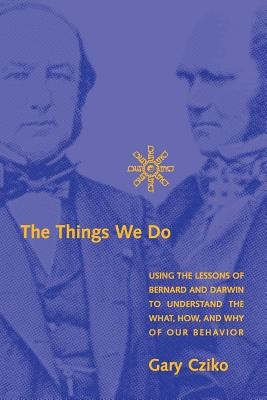
- We will send in 10–14 business days.
- Author: Gary A Cziko
- Publisher: MIT Press
- ISBN-10: 0262529440
- ISBN-13: 9780262529440
- Format: 15.2 x 22.9 x 1.6 cm, softcover
- Language: English
- SAVE -10% with code: EXTRA
Reviews
Description
Cziko shows how the lessons of Bernard and Darwin, updated with the best of current scientific knowledge, can provide solutions to certain long-standing theoretical and practical problems in behavioral science and enable us to develop new methods and topics for research.
The remarkable achievements that modern science has made in physics, chemistry, biology, medicine, and engineering contrast sharply with our limited knowledge of the human mind and behavior. A major reason for this slow progress, claims Gary Cziko, is that with few exceptions, behavioral and cognitive scientists continue to apply a Newtonian-inspired view of animate behavior as an organism's output determined by environmental input. This one-way cause-effect approach ignores the important findings of two major nineteenth-century biologists, French physiologist Claude Bernard and English naturalist Charles Darwin.
Approaching living organisms as purposeful systems that behave in order to control their perceptions of the external environment provides a new perspective for understanding what, why, and how living things, including humans, do what they do. Cziko examines in particular perceptual control theory, which has its roots in Bernard's work on the self-regulating nature of living organisms and in the work of engineers who developed the field of cybernetics during and after World War II. He also shows how our evolutionary past together with Darwinian processes currently occurring within our bodies, such as the evolution of new brain connections, provide insights into the immediate and ultimate causes of behavior.
Writing in an accessible style, Cziko shows how the lessons of Bernard and Darwin, updated with the best of current scientific knowledge, can provide solutions to certain long-standing theoretical and practical problems in behavioral science and enable us to develop new methods and topics for research.
EXTRA 10 % discount with code: EXTRA
The promotion ends in 17d.16:15:50
The discount code is valid when purchasing from 10 €. Discounts do not stack.
- Author: Gary A Cziko
- Publisher: MIT Press
- ISBN-10: 0262529440
- ISBN-13: 9780262529440
- Format: 15.2 x 22.9 x 1.6 cm, softcover
- Language: English English
Cziko shows how the lessons of Bernard and Darwin, updated with the best of current scientific knowledge, can provide solutions to certain long-standing theoretical and practical problems in behavioral science and enable us to develop new methods and topics for research.
The remarkable achievements that modern science has made in physics, chemistry, biology, medicine, and engineering contrast sharply with our limited knowledge of the human mind and behavior. A major reason for this slow progress, claims Gary Cziko, is that with few exceptions, behavioral and cognitive scientists continue to apply a Newtonian-inspired view of animate behavior as an organism's output determined by environmental input. This one-way cause-effect approach ignores the important findings of two major nineteenth-century biologists, French physiologist Claude Bernard and English naturalist Charles Darwin.
Approaching living organisms as purposeful systems that behave in order to control their perceptions of the external environment provides a new perspective for understanding what, why, and how living things, including humans, do what they do. Cziko examines in particular perceptual control theory, which has its roots in Bernard's work on the self-regulating nature of living organisms and in the work of engineers who developed the field of cybernetics during and after World War II. He also shows how our evolutionary past together with Darwinian processes currently occurring within our bodies, such as the evolution of new brain connections, provide insights into the immediate and ultimate causes of behavior.
Writing in an accessible style, Cziko shows how the lessons of Bernard and Darwin, updated with the best of current scientific knowledge, can provide solutions to certain long-standing theoretical and practical problems in behavioral science and enable us to develop new methods and topics for research.


Reviews